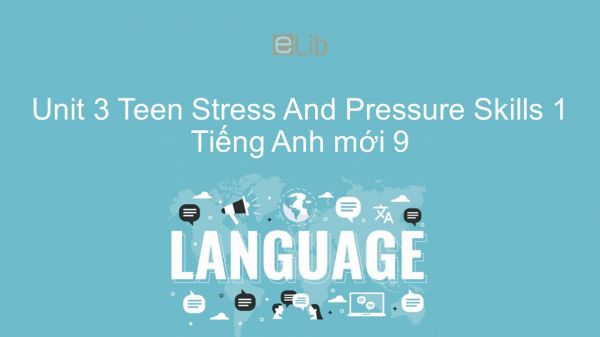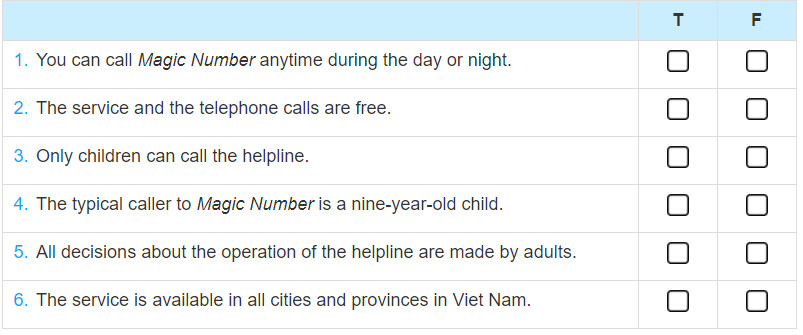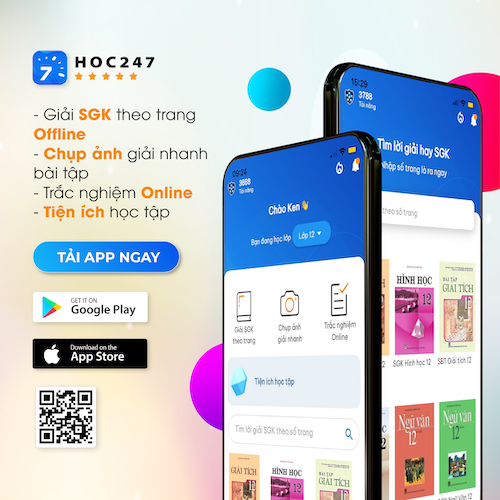Unit 3 lớp 9: Teen Stress And Pressure - Skills 1
Bài học Unit 3 lớp 9 mới phần Skills 1 giúp các em luyện tập hai kĩ năng chính là Reading và Speaking, luyện tập trả lời câu hỏi và ghi nhớ các từ vựng. Mời các em cùng tham khảo!
Mục lục nội dung

Unit 3 lớp 9: Teen Stress And Pressure - Skills 1
1. Reading
1.1. Task 1 Unit 3 lớp 9
a. Do you know what a child helpline is? (Bạn có biết đường dây trợ giúp trẻ em không? )

b. Now read the articles (Bây giờ cùng đọc bài báo sau. )
The Magic Number
Magic Number 18001567 is a 24-hour toll-free service for counselling and protecting children and young adults in Viet Nam. The helpline was set up in 2004 by the government with support from Plan Vietnam, an international children’s development organisation.
By 2014, the helpline had received over 1.5 million calls from children and adults nationwide. Sixty-nine per cent of the calls came from children and most child callers were in the 11-14 year old and 15-18 year old groups. The calls were mostly questions about family relationships, friendships, and physical and mental health. Moreover, nearly 3,000 cases of missing or abandoned children, or children who were suffering from violence, trafficking, or sexual abuse received emergency support. The helpline promotes child participation in its operations by involving children as peer communicators and decision makers.
A member of Child Helpline International, Magic Number aims to create favourable conditions for children to develop physically and mentally. If you need support or advice, or know of someone who does, just dial 18001567!
(The facts, figures, and photos in this text are provided by Plan Vietnam)
Tạm dịch:
Magic Number
Số điện thoại thần kỳ 18001567 là dịch vụ miễn phí 24 giờ để tư vấn và bảo vệ trẻ em và thanh thiếu niên ở Việt Nam. Đường dây trợ giúp đã được chính phủ thành lập năm 2004 với sự hỗ trợ của Tổ chức Viện trợ Việt Nam, một tổ chức quốc tế về sự phát triển của trẻ em.
Đến năm 2014, đường dây trợ giúp đã nhận được hơn 1,5 triệu cuộc gọi từ trẻ em và người lớn trên toàn quốc. Sáu mươi chín phần trăm các cuộc gọi đến từ trẻ em và hầu hết các em là ở các nhóm 11-14 tuổi và 15-18 tuổi. Các cuộc gọi phần lớn là các câu hỏi về mối quan hệ gia đình, tình bạn, và sức khoẻ thể chất và tinh thần. Hơn nữa, gần 3.000 trường hợp trẻ em mất tích hoặc bị bỏ rơi, hoặc trẻ em bị bạo lực, buôn bán hoặc lạm dụng tình dục đã nhận được hỗ trợ khẩn cấp. Đường dây cứu trợ khuyến khích sự tham gia của trẻ trong các hoạt động của tổ chức với tư cách là người truyền cảm hứng, người đưa ra quyết định.
Là một thành viên của Tổ chức Hỗ trợ Trẻ em, Mục tiêu của Số điện thoại thần kỳ là nhằm tạo điều kiện thuận lợi cho trẻ phát triển về thể chất và tinh thần. Nếu bạn cần hỗ trợ hoặc cố vấn, hoặc biết ai đó đang làm, chỉ cần quay số 18001567!
(Sự kiện, số liệu và hình ảnh trong văn bản này do Tổ chức Viện trợ Việt Nam cung cấp)
1.2. Task 2 Unit 3 lớp 9
Answer the questions. (Trả lời câu hỏi sau. )
Guide to answer
1. What is Magic Number 18001567?
=> It's a free service for counselling and protecting children and young adults in Viet Nam.
2. Which age groups have called the helpline?
=>They were callers in the 11-14 year-old and 15-18 year-old groups.
3. What were the calls mostly about?
=> The calls were mostly questions about family relationships, friendships, and physical and mental health.
4. Why have 3,000 calls received emergency support?
=> Because they were cases of missing or abandoned children, or children who were suffering from violence, trafficking, or sexual abuse.
5. How does Magic Number promote child participation in its operations?
=> The helpline promotes child participation in its operations by involving children as peer communicators and decision-makers
6. What is the aim of the helpline?
=> It aims to create favourable conditions for children to develop physically and mentally.
Tạm dịch:
1. Magic Number 18001567 là gì?
Đây là dịch vụ tư vấn và bảo vệ trẻ em và thanh thiếu niên miễn phí ở Việt Nam .
2. Những nhóm tuổi nào đã gọi cho đường dây trợ giúp nhiều nhất?
Họ là người gọi trong nhóm tuổi 11-14 và 15-18.
3. Các cuộc gọi chủ yếu là về điều gì?
Các cuộc gọi hầu hết là các câu hỏi về mối quan hệ gia đình, tình bạn, và sức khoẻ thể chất và tinh thần.
4. Tại sao có 3.000 cuộc gọi được hỗ trợ khẩn cấp?
Vì đây là trường hợp trẻ bị mất tích hoặc bị bỏ rơi, hoặc trẻ em bị bạo lực, buôn bán hoặc lạm dụng tình dục.
5. Magic Number thúc đẩy sự tham gia của trẻ trong các hoạt động của họ như thế nào?
Đường dây trợ giúp thúc đẩy sự tham gia của trẻ trong các hoạt động của nó bằng cách liên quan đến trẻ em như những người truyền đạt và ra quyết định.
6. Mục đích của đường dây trợ giúp là gì?
Nó nhằm tạo điều kiện thuận lợi cho trẻ phát triển về thể chất và tinh thần.
1.3. Task 3 Unit 3 lớp 9
Read the text again and decide if the following statements are true (T) or false (F). (Đọc lại đoạn văn và quyết định xem những câu sau là đúng( T) hay sai (F).)

Guide to answer
1. T 2. T 3. F 4. F 5. F 6. T
Tạm dịch:
1. Ban có thể gọi Magic Number bất cứ khi nào trong ngày hoặc đêm.
2. Dịch vụ và gọi điện thoại là miễn phí.
3. Chỉ những đứa trẻ có thể gọi đường dây hỗ trợ.
4. Người gọi điểm hình gọi cho Magic Number là trẻ em 9 tuooie.
5. Tất cả các quyết định về hoạt động của đường dây hỗ trợ do người lớn thực hiện.
6. Dịch vụ này có ở tất cả các tỉnh thành của Việt Nam.
2. Speaking
2.1. Task 4 Unit 3 lớp 9
Listen to two students calling a child helpline and complete the notes. Then use the notes te role-play the callers. (Nghe 2 học sinh gọi cho đường dây giúp đỡ trẻ em và hoàn thành chú thích sau. Sau đó sử dụng để đóng vai người gọi điện. )
Click to listen

Caller 1
Caller: _____
Feeling now: _____
Problem: _____
Question: _____
Caller 2
Caller: _____
Feeling now: _____
Problem: _____
Question: _____
Guide to answer
Caller 1
Caller: girl, from Ha Noi, last year of high school
Feeling now: a bit depressed and confused
Problem: wants to be a designer; but her parents want her to be a doctor
Question: doesn’t know what to say to her parents
Tạm dịch:
Người gọi 1:
Người gọi: nữ, từ Hà Nội, năm cuối Trung học phổ thông
Cảm giác bây giờ: có một chút chán nản và bối rối
Vấn đề: muốn trở thành nhà thiết kế, nhưng bố mẹ muốn cô ấy trở thành bác sĩ
Câu hỏi: không biết nói gì với bố mẹ cô ấy
Caller 2
Caller: boy, named Long, 13 years old, from Ho Chi Minh City
Feeling now: worried
Problem: online friend asked for 5 million dong; said if he refused to give it, his life would be difficult
Question: wonders whether to tell somebody about this
Tạm dịch:
Người gọi 2:
Người gọi: nam, tên là Long, 13 tuổi, đến từ Thành phố Hồ Chí Minh
Cảm giác bây giờ: lo lắng
Vấn đề: người bạn trên mạng yêu cầu 5 triệu đồng; nói rằng nếu anh ấy từ chối đưa nó, cuộc sống của anh ấy sẽ gặp khó khăn
Câu hỏi: liệu có nên nói với mọi người điều này
Audio script:
Caller 1: (girl) Hi, I'm from Ha Noi. I'm in my last year of high school. I'm feeling a bit depressed about my situation. I've been studying really hard to satisfy my parents and have always had good grades. But last week they said that they didn't want me to go to Arts School to be a designer. They want me to be a doctor. I feel confused... I don't know what to say to my parents.
Caller 2: (boy) My name's Long. I'm 13 and I'm from Ho Chi Minh City. I made a friend playing online games, and we've met several times in real life to play video games in Internet cafés. Last week he told me he needed 5 million dong and asked if I could help him. I said no, but two days ago he said he would make my life difficult if I didn’t give him the money. I'm a bit worried. Should I tell somebody about this?
Tạm dịch:
Người gọi 1: (nữ) Xin chào, tôi đến từ Hà Nội. Tôi đang học năm cuối cấp 3. Tôi đang cảm thấy chán nản về trường hợp của tôi. Tôi đang học thực sự chăm chỉ để hài lòng bố mẹ và luôn đạt điểm số tốt. Nhưng tuần trước, họ nói rằng họ không muốn tôi thi vào trường Nghệ thuật để làm nhà thiết kế. Họ muốn tôi trở thành bác sĩ. Tôi cảm thấy mung lung, bối rối ... Tôi không biết phải nói gì với bố mẹ tôi.
Người gọi 2: (nam) Tên của tôi là Long. Tôi 13 tuổi và tôi đến từ TP Hồ Chí Minh. Tôi kết bạn với một người bạn chơi game trên mạng, và chúng tôi gặp nhau vài lần ngoài đời thực để chơi game ở quán cà phê Internet. Tuần trước, anh ấy bảo tôi anh ấy cần 5 triệu đồng và hỏi tôi xem liệu tôi có thể giúp anh ấy không. Tôi nói không, nhưng 2 ngày sau anh ấy nói anh ấy sẽ làm cho cuộc sống của tôi khó khăn nếu tôi không đưa anh ấy tiền. Tôi có chút lo lắng. Tôi có nên nói với mọi người về điều này?
2.2. Task 5 Unit 3 lớp 9
Look at 2, A CLOSER LOOK 1. Imagine you are one of these students. You want to call the Magic Number helpline to ask for help. What do you say? Your partner listens and takes notes. (Nhìn vào bài 2 phần A Closer look 1. Tưởng tượng bạn là một trong những học sinh đó. Bạn muốn gọi tới đường dây trợ giúp Number để nhờ giúp đỡ. Bạn nên nói gì? Bạn nhóm của bạn sẽ nghe và ghi lại.)
Gợi ý
- briefly introduce yourself (you can choose whether to say your name and address or not) (giới thiệu ngắn gọn về bản thân( bạn có thể chọn cách giới thiệu tên và địa điểm hoặc không)
- describe your problem/dilemma (mô tả vấn đề của bạn / tình huống khó xử)
- ask for help (yêu cầu giúp đỡ)
Guide to answer
My name is Hoa and I live in Quang Nam. Recently I have encountered some problems. One of them is that I feel worried when I have to wait for the bus in that neighbourhood after my evening class. It’s so quiet and dark there. I wonder whether to ask the local authority to install light poles along that road or not.
Tạm dịch:
Tên cháu là Hòa và cháu sống ở Quảng Nam. Gần đây cháu gặp một số vấn đề. Một trong số chúng là cháu cảm thấy lo lắng khi phải đợi xe buýt ở trong khu vực đó sau khi tan học buổi tối. Ở đó quá yên ắng và tối tăm. Cháu tự hỏi liệu có nên yêu cầu chính quyền địa phương lắp đặt các cột đèn dọc con đường đó hay không.
3. Practice Task 1
Read the passage, and choose the correct answer A, B, C or D for each question.
If parents bring up a child with the sole aim of turning the child into a genius, they will cause a disaster. According to several scientists, this is one of the biggest mistakes which ambitious parents make. Generally, the child will be only too aware of what his parents expect, and will fail. Unrealistic parental expectations can cause great damage to children.
However, if parents are not too unrealistic about what they expect their children to do, but are ambitious in a sensible way, the child may succeed in doing very well - especially if the parents are very supportive of their child.
Michael is very lucky. He is crazy about music, and his parents help him a lot by taking him to concerts and arranging private piano and violin lessons for him. They even drive him 50 kilometers twice a week for violin lessons. Michael's mother knows very little about music, but his father plays the trumpet in a large orchestra. However, he never makes Michael enter music competitions if he is unwilling.
Winston, Michael's friend, however, is not so lucky. Both his parents are successful musicians, and they set too high a standard for Winston. They want their son to be as successful as they are and so they enter him for every piano competition held. They are very unhappy when he does not win. Winston is always afraid that he will disappoint his parents and now he always seems quiet and unhappy.
Question 1: One of the serious mistakes parents can make is to …………
A. push their child into trying too much
B. help their child to become a genius
C. make their child become a musician
D. neglect their child's education
Question 2: Parents' ambition for their children is not wrong if they ………….
A. force their children into achieving success
B. themselves have been very successful
C. understand and help their children sensibly
D. arrange private lessons for their children
Question 3: Michael is fortunate in that ………..
A. his father is a musician B. his parents are quite rich
C. his mother knows little about music D. his parents help him in a sensible way
Question 4: Winston's parents push their son so much and he ………..
A. has won a lot of piano competitions
B. cannot learn much music from them
C. has become a good musician
D. is afraid to disappoint them
Question 5: The two examples given in the passage illustratethe principle that ……….
A. successful parents always have intelligent children
B. successful parents often have unsuccessful children
C. parents should let the child develop in the way he wants
D. parents should spend more money on the child's education
4. Practice Task 2
Read the following text about Bill Gate, the co-founder of Microsoft, and choose the best answer.
Bill Gates is the co-founder of Microsoft, the world’s largest PC software company. He is among the richest people in the world. Bill Gates’ interest in computers started when he was a teenager. After high school, he was accepted to several top colleges in the USA: Harvard, Yale, and Princeton. He chose to go to Harvard to study law. At Harvard, he focused more on his interest in computer than on coursework. He often relaxed by playing video games in Harvard’s computer lab. He left Harvard before graduating because he wanted to open a software company with his friend Paul Allen. However, he later said, “ I don’t think dropping out is a good idea.” In 2007, he received an honorary degree from Harvard. He began his speech by saying this to his father in the audience. “I’ve been waiting more than 30 years to say this: Dad, I always told you I’d come back and get my degree.” Bill Gates is no longer working full time for Microsoft. He is now, with his wife, running The Bill & Melinda Gates Foundation which aims to improve healthcare, reduce poverty, and promote education around the world.
Question 1: When did Bill Gates first develop his interest in computers?
A. during his teenage years
B. when he went to university
C. when he was at nursery school
Question 2: What did he study at Harvard University?
A. computer science B. business C. law
Question 3: What did he often do to relax while at Harvard?
A. play sports B. play video games C. go to parties
Question 4: Why did he drop out of Harvard?
A. because he was ill
B. because he wanted to study at another university
C. because he wanted to start a software company
Question 5: What did he receive from Havard in 2007 ?
A. an honorary degree B. a job C. a company
5. Conclusion
Kết thúc bài học các em cần luyện đọc, luyện nói và ghi nhớ các từ vựng sau:
- counsel /ˈkaʊnsl/ tư vấn
- abandoned /əˈbændənd/ mồ côi
- violence /ˈvaɪələns/ bạo lực
- abuse /əˈbjuːs/ quấy rối
- trafficking /ˈtræfɪkɪŋ/ buôn bán người
- available /əˈveɪləbl/ có sẵn
- exhausted /ɪɡˈzɔːstɪd/ kiệt sức
- install /ɪnˈstɔːl/ lắp đặt
- force /fɔːs/ ép, cưỡng ép
- fair /feə(r)/ công bằng
Tham khảo thêm
- doc Unit 3 lớp 9: Teen Stress And Pressure - Getting Started
- doc Unit 3 lớp 9: Teen Stress And Pressure - A Closer Look 1
- doc Unit 3 lớp 9: Teen Stress And Pressure - A Closer Look 2
- doc Unit 3 lớp 9: Teen Stress And Pressure - Communication
- doc Unit 3 lớp 9: Teen Stress And Pressure - Skills 2
- doc Unit 3 lớp 9: Teen Stress And Pressure - Looking Back
- doc Unit 3 lớp 9: Teen Stress And Pressure - Project




